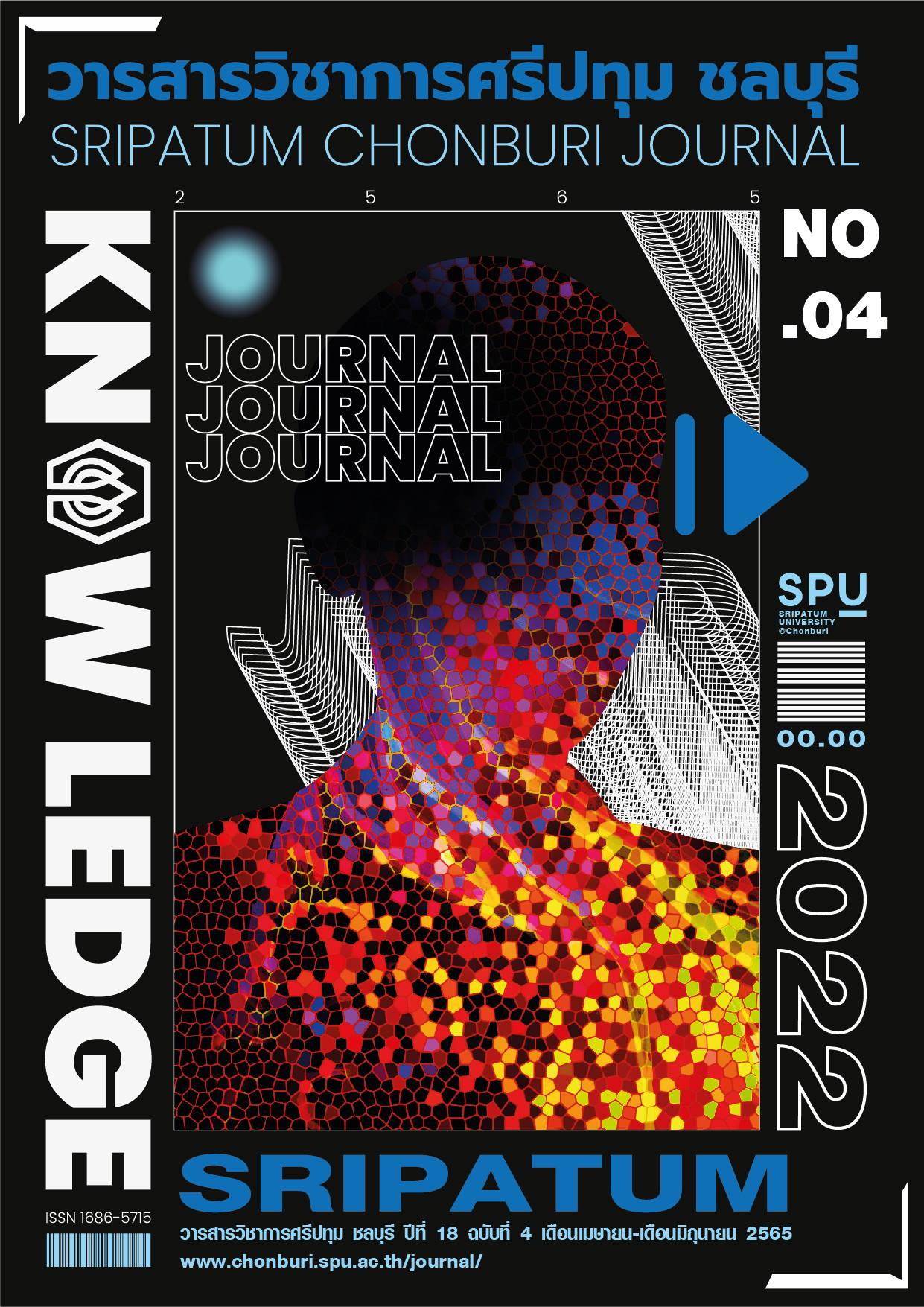TEACHERS’ GUIDELINES IN EDUCATIONAL MANAGEMENT TO PROMOTE QUALITY OF AN ECO-FRIENDLY GROWTH LIFE FOR SECONDARY STUDENTS IN RAYONG PROVINCE
Keywords:
guidelines in educational management, secondary education, quality of an eco-friendly growth lifeAbstract
This research aimed to study the conditions of teachers’ educational management to promote quality of an eco-friendly growth life for secondary students in Rayong province and propose guidelines in their educational management. The research was a mixed method. The samples, selected by using non proportional stratified random sampling, were 320 secondary school teachers in Rayong province. Eight key informant teachers were interviewees by in-depth interview. Questionnaire and structural interview form were the research instruments. The questionnaire’s quality was tested by content validity (IOC = .97) and reliability (α-Cronbach coefficient = .947). The structural interview form was checked for the appropriateness of the questions by 3 experts. The statistics for data analysis were frequency, percentage, mean, independent t test, one-way ANOVA, and triangulation. The results of the research were found, as follows: 1) Each aspect of the conditions of teachers’ educational management to promote quality of an eco-friendly growth life for secondary students in Rayong province was found at a high level. Learning management to the Sufficiency Economy Philosophy was the most ranking while learning management on environmental education was the lowest ranking. When studying personal factors of teachers, it was found that age, education level, teaching experience and subject groups affected different educational management of teachers while gender did not affect educational management, and 2) The guidelines in teachers’ educational management to promote quality of an eco-friendly growth life for secondary students in Rayong province were found that the teachers employed learning resources, activity-based learning, problem-based learning, and integrated learning.
References
กรมควบคุมมลพิษ. (2561). รายงานสรุปสถานการณ์มลพิษของประเทศไทย พ.ศ. 2561. กรุงเทพฯ: กรมควบคุมมลพิษ.
โชคอนันต์ จึงเจริญรัตน์. (2555). การวิเคราะห์ความเข้าใจและการปฏิบัติงานตามการรับรู้ของครูตามนโยบายการศึกษา. วิทยานิพนธ์ครุศาสตรมหาบัณฑิต สาขาวิชา
วิธีวิทยาการวิจัยการศึกษา, คณะครุศาสตร์ จุฬาลงกรณ์มหาวิทยาลัย.
เพ็ญศรี พงษ์ประภาพันธ์, ทิพพาพรรณ เดียวประเสริฐ และวิสาลินี นุกันยา. (2554). สมรรถนะการจัดการเรียนการสอนโดยเน้นผู้เรียนเป็นสำคัญ ตามการรับรู้ของอาจารย์
และนักศึกษามหาวิทยาลัยกรุงเทพธนบุรี กรุงเทพมหานคร. วารสารพยาบาลกระทรวงสาธารณสุข, 21(2), หน้า 29-38.
ภัทรพงษ์ วรรณกุล. (2554). สภาพการจัดการเรียนรู้ตามหลักสูตรแกนกลางการศึกษาขั้นพื้นฐาน พุทธศักราช 2551 ของโรงเรียนเตรียมอุดมศึกษาน้อมเกล้า
สมุทรปราการ. งานนิพนธ์การศึกษามหาบัณฑิต สาขาวิชาการบริหารการศึกษา, คณะศึกษาศาสตร์ มหาวิทยาลัยบูรพา.
วศิน ชูชาติ. (2559). ปัจจัยที่ส่งผลต่อความสามารถในการจัดการเรียนรู้ของครูเพื่อส่งเสริมทักษะการเรียนรู้ของผู้เรียนแห่งศตวรรษที่ 21 จังหวัดสุพรรณบุรี. วิทยานิพนธ์
ศึกษาศาสตรมหาบัณฑิต สาขาวิชาพัฒนศึกษา, คณะศึกษาศาสตร์ มหาวิทยาลัยศิลปากร.
วินัย วีระวัฒนานนท์. (2541). สิ่งแวดล้อมและการพัฒนา (พิมพ์ครั้งที่ 3). กรุงเทพฯ: คณะศึกษาศาสตร์ มหาวิทยาลัยศรีนครินทรวิโรฒ.
สำนักงานจังหวัดระยอง. (ม.ป.ป.). สรุปข้อมูลจังหวัดระยอง 2562 (ออนไลน์). เข้าถึงได้จาก: http://123.242.173.8/v2/images/rayongdata62.pdf [2564, 15
มกราคม].
สำนักงานเลขาธิการสภาการศึกษา. (2560). แผนการศึกษาแห่งชาติ พ.ศ. 2560-2579 (ออนไลน์). เข้าถึงได้จาก:
http://www.onec.go.th/index.php/book/BookView/1540 [2563, 13 พฤศจิกายน].
สำนักงานศึกษาธิการจังหวัดระยอง. (2560). แผนพัฒนาการศึกษา (พ.ศ. 2562-2565) จังหวัดระยอง (ออนไลน์). เข้าถึงได้จาก:
http://rayongpeo.go.th/images/data/แผนพัฒนาการศึกษาจังหวัดระยอง%20(62-65)%20รวมไฟล์.pdf [2563, 19 พฤศจิกายน].
อรพรรณ ทิมครองธรรม. (2560). ปัจจัยที่ส่งผลต่อการจัดการเรียนรู้ในศตวรรษที่ 21 ของครูสหวิทยาเขตเบญจบูรพา สังกัดสำนักงานเขตพื้นที่การศึกษามัธยมศึกษา
เขต 2. วารสารนาคบุตรปริทรรศน์ มหาวิทยาลัยราชภัฏนครศรีธรรมราช, 9(1), หน้า 97-105.
Bandura, Albert. (1989). Social cognitive theory. In R. Vasta (Ed.), Annals of child development. Six theories of child development (Vol. 6)
(pp. 1-60). Greenwich, CT: JAI.
Kelani, Raphael R. (2015). Integration of environmental education in science curricula in secondary schools in Benin, West Africa: Teachers’
perceptions and challenges. Electronic Journal of Science Education, 19(3), pp. 1-24.
Krejcie, Robert V., & Morgan, Daryle W. (1970). Determining sample size for research activities. Educational and Psychological Measurement,
(3), pp. 607-610.
Valderrama-Hernández, Rocío, Alcántara, L., & Limón, D. (2017). The complexity of environmental education: Teaching ideas and strategies
from teachers. Procedia-Social and Behavioral Sciences, 237, pp. 968-974.
Young, Jessica Lynn Michelle. (2009). All education is environmental education. Master Thesis of Education, Faculty of Education, Queen's
University Kingston, Ontario, Canada.
Downloads
Published
Issue
Section
License

This work is licensed under a Creative Commons Attribution-NonCommercial-NoDerivatives 4.0 International License.
บทความทุกบทความเป็นลิขสิทธิ์ของวารสารวิชาการศรีปทุม ชลบุรี



